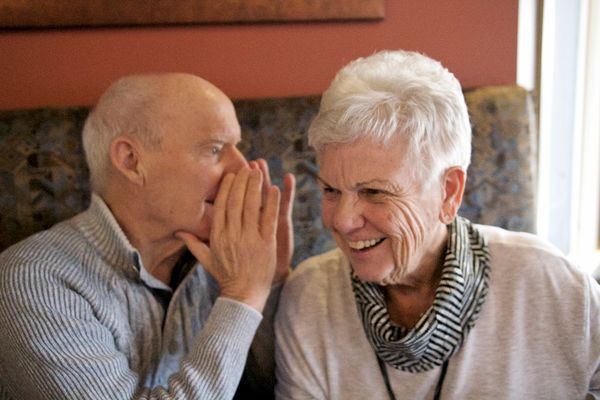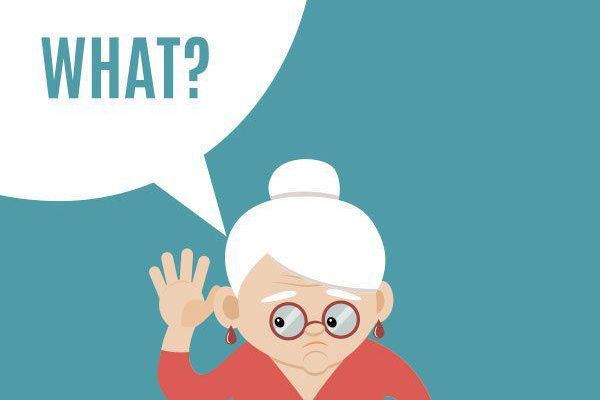In August, a Food and Drug Administration (FDA) policy change opened the door for hearing aids to be sold over the counter (OTC), and as of October 17, 2022, consumers can now purchase hearing aids directly, without consulting a healthcare provider.
The Biden-Harris administration said the move will lower healthcare costs for consumers. Medicare provides no coverage for the devices, and because prescription hearing aids can cost thousands of dollars, it’s estimated that only 14% of older adults with hearing loss who could benefit from hearing aids actually use them. Overall, better access to over the counter hearing aids is anticipated to impact nearly 30 million people in the U.S.
We spoke with Baltimore-based audiologist Rachel Raphael and Erin Stauder, CEO of the Hearing and Speech Agency (HASA), who shared the pros and cons of over-the-counter hearing aids, and what they want women to know before purchasing hearing aids for themselves or for loved ones.
Set realistic expectations
Raphael likened over-the-counter hearing aids to being able to purchase reading glasses in a drugstore. “Reading glasses are great — they’re cheap, and I keep them all over the house,” she said. But, according to Raphael, they don’t provide a solution for more complicated vision issues. “If you need glasses that are personalized to your specific vision needs, you’ll need to see a doctor.”
Stauder said she’s heard the analogy to reading glasses frequently with this rule change. “That analogy is a good one, but it does have limitations. HASA supports affordable options, but we strongly believe an audiologist or medical professional needs to be part of the conversation. There’s the potential here to not get what you need and even, in some cases, to harm the auditory system. We’re supportive of more accessible products, but there are limitations to what you can achieve with just a product.”
Most people don’t realize there’s an adjustment period to using hearing aids, Stauder said. “People think you put in the hearing aids and it’s, ‘Oh, I hear better now.’ It’s not like that, and in some cases, there’s programming that needs to happen as well.”
You get what you pay for
While “over-the-counter” typically implies cost savings for consumers, Stauder warned that you can’t call these hearing aids cheap. “These devices are still going to be hundreds of dollars for consumers,” Stauder said. “And they’re not going to be on a shelf. They’re likely going to be behind the counter, and you’re going to have to talk to someone to access them. That someone might as well be a medical professional.”
Raphael cautioned against trying to save money by not seeing a medical professional first to rule out possible, treatable causes of hearing loss. “You could spend all this money on a hearing aid that isn’t going to help because you have ear wax or a middle ear infection,” Raphael said.
For some people with uncomplicated, mild-to-moderate hearing loss, Raphael said, an over-the-counter hearing aid will be just fine. But hearing loss can be complicated, and it’s difficult for a layperson to know whether their hearing loss is simple or complex, or even if it’s mild, moderate or severe.
Hearing aids generally have three or four different tiers, depending on the manufacturer — entry-level, basic, mid-level and premium — and the higher tiers are more expensive, Raphael said. “The tiers make a difference. You might start with an ‘entry-level’ hearing aid that just amplifies noise. Mid-level and premium options are far more complex and process speech, locate the direction of speech and recognize background noise.”
Some insurance plans cover more complex prescription hearing aids. “If you have insurance that covers hearing aids, in general, they’ll offer a price cap for coverage that pays for a basic pair every three to five years, with the option to pay out-of-pocket to upgrade,” Raphael said.
Hearing aids are not “pop in and go”
While hearing aids are no longer the huge, visible, squealing devices from the last century, they’re high-tech, and that can be both a pro and a con for the consumer.
Raphael said a great deal of her work as an audiologist involves fixing problems with hearing aids. “There are so many ways for technology to break down and so many reasons it does,” Raphael said. “I’m fixing problems the average person would have no idea how to fix. Ever since hearing aids became Bluetooth-compatible, I can’t tell you how much time I spend troubleshooting.”
When considering an OTC hearing aid purchase, Raphael said, read the warranty, and find out which parts are included and how to get service if something goes wrong. “Something may look inexpensive on the shelf but nickel-and-dime you in the end,” Raphael said.
Don’t get discouraged, get tested
While some audiologists are concerned that sales of over-the-counter hearing aids will negatively affect their business, Raphael believes the opposite will happen. “I think audiologists are going to see a lot of people who aren’t happy with their results from over-the-counter hearing aids,” she said. “I hope that rather than giving up on getting help, they’ll consult with a medical professional and get a detailed analysis of what’s going on. In general, people wait five to seven years to seek help for hearing loss. Hearing is so important to overall health. Dementia, depression and anxiety have been linked to hearing loss. Over-the-counter hearing aids might not provide the best fit for everyone, but they could provide a gateway to getting better care for their hearing.”
Resources
American Academy of Audiology
American Speech-Language-Hearing Association







